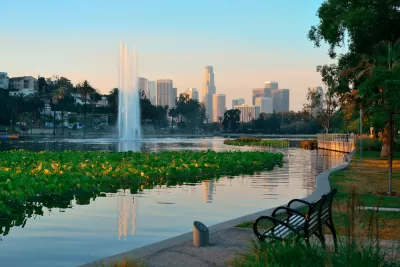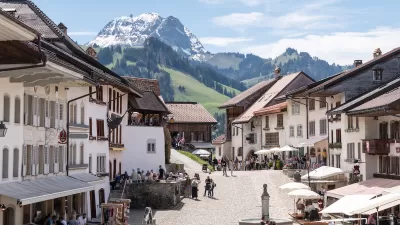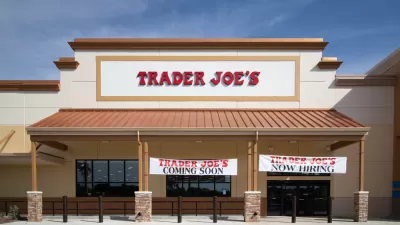Last week, leaders of the initiative to curb development in L.A. surprisingly presented Mayor Eric Garcetti with an ultimatum: Agree to their list of demands by August 24, or they will take the issue to the March 2017 ballot.

The Neighborhood Integrity Initiative, the March 2017 ballot proposed by The Coalition to Preserve L.A., has sent shockwaves through the development community since it was announced earlier this year. The Coalition to Preserve L.A., largely underwritten by the Los Angeles-based AIDS Healthcare Foundation, has led to a competing affordable housing ballot initiative, Build Better L.A., that is being led to a coalition of labor unions and affordable housing groups.
On Wednesday, August 17, leaders of the Los Angeles-based Neighborhood Integrity Initiative and a representative array of community leaders met with Mayor Eric Garcetti in his office to present a letter with detailed demands for long-promised development reform.
In an exclusive interview with The Planning Report, Neighborhood Integrity Initiative Campaign Director Jill Stewart explains the measures included in the letter to Mayor Garcetti, and additional reforms she hopes to see championed by elected officials. Below are excerpts of Stewart describing the demands:
We ask in the letter for four different types of reforms at a minimum:
First, we want an end to developer and special interest lobbyists being able to choose their consultants to write environmental impact reports (EIRs) for their own developments.
Second, we want a clear and transparent process for fast-tracking a deadline for a new General Plan that will empower the people to determine the future of this city. We want to end the influence of these developers, especially when it comes to areas that under transformation like the LA River.
Third, we need the end of spot-zoning exemption to the General Plan.
Fourth, ending ex-parte (closed-door) communications and meetings between developers and city councilmembers, city planning commission members, or mayor’s appointees.
If the mayor agrees to these conditions, the Neighborhood Integrity Initiative promises to halt their initiative campaign.
Stewart, a former editor at L.A. Weekly, also shared many of the lessons she’s learned while campaigning in city neighborhoods with The Planning Report. The Coalition to Preserve L.A. had previously called for a two-year moratorium on spot-zoning, but explains that this letter calls for an end to spot-zoning exemptions to the General Plan immediately.
Explaining the feelings of anger that the members of the Coalition to Preserve Los Angeles are feeling, she shares:
"They are angry at the arrogance of politicians abiding by this theoretical belief that we are all going to get on Metro and it's going to be great in 10 or 15 years, and residents just have to suffer through it. These residents don’t believe that. These residents feel like they can’t point to a single city that is more livable when pushing all of this development."
Throughout the interview, much of Stewart's comments controversially pushed back against the urban planning paradigm that major cities have been undertaking to invest in public transportation, urban infill, and increasing housing supply to adapt to both population growth and life expectancy increases.
As of the time of this post, City Hall had not responded or even publicly commented on the group's demands. The Neighborhood Integrity Initiative has until today to submit its signatures for the March 2017 ballot.
FULL STORY: Neighborhood Integrity Initiatives’s Letter to Mayor Garcetti: Either Lead on Planning or Voters Will

Study: Maui’s Plan to Convert Vacation Rentals to Long-Term Housing Could Cause Nearly $1 Billion Economic Loss
The plan would reduce visitor accommodation by 25,% resulting in 1,900 jobs lost.

North Texas Transit Leaders Tout Benefits of TOD for Growing Region
At a summit focused on transit-oriented development, policymakers discussed how North Texas’ expanded light rail system can serve as a tool for economic growth.

Using Old Oil and Gas Wells for Green Energy Storage
Penn State researchers have found that repurposing abandoned oil and gas wells for geothermal-assisted compressed-air energy storage can boost efficiency, reduce environmental risks, and support clean energy and job transitions.

Private Donations Propel Early Restoration of Palisades Playground
Los Angeles has secured over $1.3 million in private funding to restore the Pacific Palisades playground months ahead of schedule, creating a modern, accessible space that supports community healing after recent wildfires.

From Blight to Benefit: Early Results From California’s Equitable Cleanup Program
The Equitable Community Revitalization Grant (ECRG) program is reshaping brownfield redevelopment by prioritizing projects in low-income and environmental justice communities, emphasizing equity, transparency, and community benefits.

Planting Relief: Tackling Las Vegas Heat One Tree at a Time
Nevada Plants, a Las Vegas-based nonprofit, is combating the city’s extreme urban heat by giving away trees to residents in underserved neighborhoods, promoting shade, sustainability, and community health.
Urban Design for Planners 1: Software Tools
This six-course series explores essential urban design concepts using open source software and equips planners with the tools they need to participate fully in the urban design process.
Planning for Universal Design
Learn the tools for implementing Universal Design in planning regulations.
Ascent Environmental
Borough of Carlisle
Institute for Housing and Urban Development Studies (IHS)
City of Grandview
Harvard GSD Executive Education
Toledo-Lucas County Plan Commissions
Salt Lake City
NYU Wagner Graduate School of Public Service





























